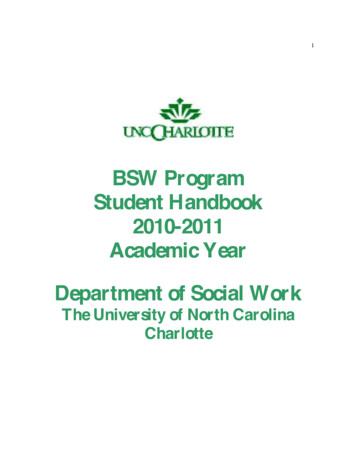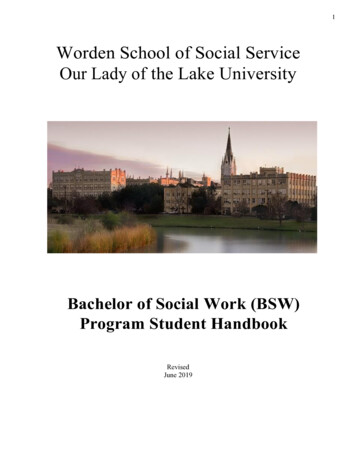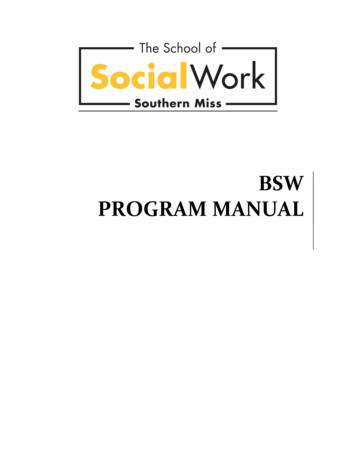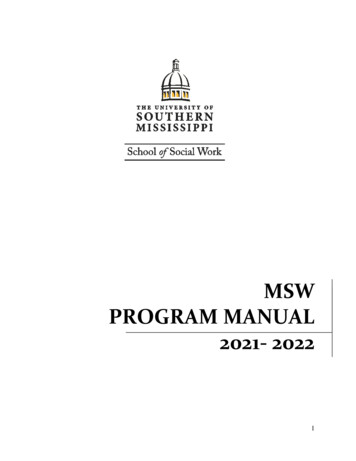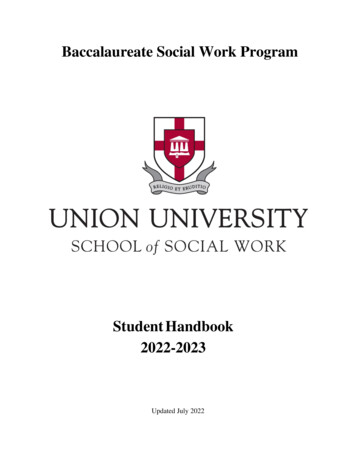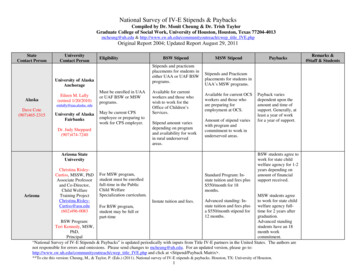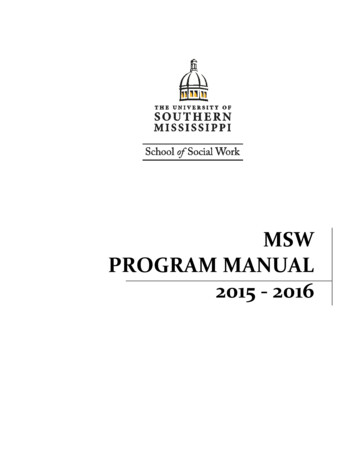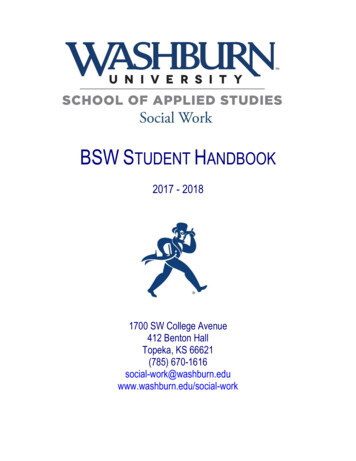
Transcription
BSW ProgramStudent Handbook2021 - 2022Academic YearUpdated 6/2021
2School of Social Work Faculty and StaffBSW Program DirectorRoger F. Suclupe, MSW, LCSW, Clinical Assistant ProfessorField Education DirectorTicola Ross, PhD, MSW, LCSW Clinical Assistant ProfessorField Education CoordinatorFrances Ferrante-Fusilli, MSW, LCSW Clinical Assistant ProfessorDr. A. Suzanne Boyd, PhD, ACSW, CMSW, ProfessorDr. Dante D. Bryant, PhD, MSSW, MTS, Assistant ProfessorDr. Tianca Crocker, PhD, MSW, Assistant ProfessorDr. Jim Dudley, PhD, MSW, LCSW, Professor EmeritusKevin Edwards-Knight, MSW, LecturerJacquelyn Garcia, MSW, LCSW, LecturerDr. Yuqi Guo, PhD, MSW, Assistant ProfessorDr. Travis Hales, PhD, MSW, MSW Program Director, Assistant ProfessorDr. Shanti Kulkarni, PhD, MSW, ProfessorDr. E. Othelia Lee, PhD, MSW, ProfessorDr. Susan McCarter, PhD, MSW, ProfessorDr. Annelise Mennicke, PhD, MSW, Assistant ProfessorMatthew Mills, MSW, LCSW, LecturerDr. Julian Montoro-Rodriguez, PhD, Director of Gerontology and ProfessorMrs. Amy Peters, MSW, School of Social Work Asst. Director, Distance Ed. Coord., and Senior LecturerDr. Sonyia Richardson, PhD. MSW, LCSW, Assistant ProfessorDr. Diana Rowan, PhD, MSW, LCSW, ProfessorKris Taylor, MSW, LCSW, LecturerDr. Beth Wahler, PhD, MSW, School of Social Work DirectorDr. Cheryl Waites Spellman, EdD, MSW, LMSW, ProfessorCandice Whiteside, MSW, LCSW, LecturerStaffBridget Alaniva, Project Coordinator, Student Outreach and EngagementJanet Baker, Program AssociateCheryl Whitely, Administrative Support SpecialistCali Wickert, Program Associate and Field Education SpecialistSchool Address and Contact Information:The University of North Carolina at CharlotteCollege of Health and Human ServicesSchool of Social Work9201 University City BoulevardCharlotte, North Carolina 28223-0001Phone: 704-687-7938; FAX: 704-687-2343Website: https://socialwork.uncc.edu/BSW Website: sw/bachelor-social-work-overview
3University of North Carolina at Charlotte Undergraduate Catalog: https://catalog.uncc.edu/College of Health and Human Services book.pdf
4TABLE OF CONTENTSWelcome and Introduction .5Social Work as a Profession 7Social Work Education . .8BSW Degree Requirements .13BSW Major Curriculum Plan .14Advising 17Social Work Course Descriptions 18Upper Division Progression Policy. 20Transfer Credit 20Credit for Life and Work Experience .20Residency Requirement .21Grade of Incomplete 21North Carolina Child Welfare Education Collaborative .21BSW Program Standards for Social Work Education. 22Student Conduct . .23Multistep Resolution Process . . . .24Grievance Policies . 26Policies and Procedures for review.27Other University Policies .28Non-discrimination Policy .29Student Organizations .32Honors, Awards & Scholarships .33Appendices. .36-46
5Welcome and IntroductionWelcome to the School of Social Work Baccalaureate of Social Work (BSW) Program! We areexcited to celebrate our 31st year of providing the Baccalaureate Social Work degree at UNCCharlotte. It’s important to acknowledge our history in order to celebrate our accomplishments.Social Work education at UNC Charlotte is a long-standing tradition. Social work courses werefirst offered as supplemental courses in the Sociology major in 1970. By 1989, a full BSWDegree program was established. The UNC Charlotte BSW major achieved nationalaccreditation through the Council on Social Work Education (CSWE) in 1992, and the BSWProgram has been nationally accredited ever since. Beginning in 2000, a Master of Social Work(MSW) Program was added to the Department. In the summer of 2006, the School began itsAdvanced Standing Program, allowing those possessing the BSW degree to obtain their MSWin one full calendar year (May to May). In 2017, the School added a 3 Year MSW Hybridprogram that offered flexibility for individuals interested in pursuing an MSW degree while theyworked. Starting summer 2021, the 3 Year MSW Hybrid program became a fully online MSWprogram. These are exciting new opportunities for UNC Charlotte BSW students and forcommunity members who already possess the BSW degree.UNC Charlotte graduates are employed in areas such as family preservation, mental health,intellectual and developmental disabilities, gerontology, child protective services, substance usetreatment facilities, hospitals, youth and children services, criminal justice, adoptions/fostercare, hospice, and long term care. Our graduates work from the coast to the mountains of NorthCarolina as well as across the United States. As a graduate of the BSW Program at UNCCharlotte, you will join the ranks of influential professional social workers that make adifference in the lives of thousands of people. Welcome to the challenge!There are 2 important manuals that you need to review as a BSW student: 1) BSW ProgramManual, and 2) Field Education Handbook. This Student Handbook contains information aboutthe BSW major and the UNC Charlotte School of Social Work. School policies and proceduresfor entering the major, navigating the curriculum, and proceeding successfully towardgraduation are included. Please read the handbook in its entirety; a bit of time spent now willgreatly enhance your experience in the program.BSW students must comply with University policies as well. They are not reproduced in thishandbook, and you remain responsible for knowing about and complying with all Universitypolicies. You can access university-based policies on the UNC Charlotte website located atwww.uncc.edu.Please note: The BSW Program requires students to use their UNC Charlotte email accounts,and to check their accounts frequently. Members of the School are required to use the UNCCharlotte email system when communicating with you (and not personal email addresses).Checking and responding to email facilitates good communication between the School andstudents.
6UNC Charlotte MissionUNC Charlotte is North Carolina’s urban research university. It leverages its location in thestate’s largest city to offer internationally competitive programs of research and creativeactivity, exemplary undergraduate, graduate, and professional programs, and a focused set ofcommunity engagement initiatives. UNC Charlotte maintains a particular commitment toaddressing the cultural, economic, educational, environmental, health, and social needs of thegreater Charlotte region.UNC Charlotte Vision and ValuesIn fulfilling our mission, we envision a University that promises: An accessible and affordable quality education that equips students with intellectual andprofessional skills, ethical principles, and an international perspective. A strong foundation in liberal arts and opportunities for experiential education toenhance students’ personal and professional growth. A robust intellectual environment that values social and cultural diversity, freeexpression, collegiality, integrity, and mutual respect. A safe, diverse, team-oriented, ethically responsible, and respectful workplaceenvironment that develops the professional capacities of our faculty and staff.To achieve a leadership position in higher education, we will: Rigorously assess our progress toward our institutional, academic, and administrativeplans using benchmarks appropriate to the goals articulated by our programs and in ourplans. Serve as faithful stewards of the public and private resources entrusted to us and provideeffective and efficient administrative services that exceed the expectations of our diverseconstituencies. Create meaningful collaborations among university, business, and community leaders toaddress issues and opportunities of the region. Develop an infrastructure that makes learning accessible to those on campus and in ourcommunity and supports the scholarly activities of the faculty. Pursue opportunities to enhance personal wellness through artistic, athletic, orrecreational activities. Operate an attractive, environmentally responsible and sustainable campus integratedwith the retail and residential neighborhoods that surround us.College of Health and Human Services at the University of North Carolina at CharlotteThe School of Social Work is located within the College of Health and Human Services(CHHS) at UNC Charlotte. CHHS is comprised of the following academic units: TheDepartment of Kinesiology, The Department of Public Health Sciences, the School of SocialWork, and the School of Nursing. Graduate and undergraduate degree programs are offered
7within our college and our programs are professionally recognized, accessible, nationally andglobally relevant, and responsive to changing needs of health care and human services in thestate and region. We also host the interdisciplinary Gerontology and Health Informaticsprograms.The mission of CHHS is to achieve excellence through informed and effective teaching in itsdegree programs, community partnerships, professional activities and scholarship to createknowledge, advance science and inform ethical and culturally responsive practice in the healthand human service professions. We aspire to grow our national and global relevance and toremain responsive to the changing health care and human service needs of our urban region andthe state.School of Social Work at UNC CharlotteThe social work graduate and undergraduate program was previously housed within aDepartment of Social Work. In 2015, with approval from the University, the departmenttransitioned into a School of Social Work. This designation furthered opportunities forcontinued growth, expansion and development.In 2016, the School of Social Work hired its inaugural Director, Dr. Schnavia Hatcher. In 2017,an Assistant Director of the School of Social Work, Professor Amy Peters, was hired to assistwith administrative oversight and accreditation. Additionally, the School of Social Workimplemented a Hybrid 3Year Master of Social Work (MSW) degree which is located primarilywithin the UNC Charlotte Center City location. Beginning Summer 2021, the Hybrid 3 YearMSW program became fully online. Also, in June 2021, Dr. Beth Wahler was hired as the newDirector of the School of Social Work.Vision of the School of Social WorkThe vision of the School of Social Work is to foster optimal health and well-being, equal humanrights, and a just society.Mission of the School of Social WorkThe mission of the School of Social Work is to prepare future social work professionals forleadership in culturally-informed, community-engaged practice, policy, and research, with aparticular emphasis on persistent and emerging social problems in rapidly diversifying urbanareas locally, nationally, and globally.Social Work as a ProfessionThe UNC Charlotte School of Social Work philosophically aligns itself with the social workprofession as depicted by the professional associations of the National Association of SocialWorkers (NASW) and the Council on Social Work Education (CSWE). According to theNASW Code of Ethics (National Association of Social Workers, 2008), the primary mission ofthe social work profession is to:
8Enhance human well-being and help meet the basic human needs of all people,with particular attention to the needs and empowerment of people who arevulnerable, oppressed, and living in poverty. A historic and defining feature ofsocial work is the profession’s focus on individual well-being in a social contextand the well-being of society. Fundamental to social work is attention to theenvironmental forces that create, contribute to, and address problems in living. (p.1)The social work profession is rooted in six core values including: 1) service; 2) socialjustice; 3) dignity and worth of the person; 4) importance of human relationships; 5)integrity; 6) competence. Additionally, we strongly adhere to the NASW Code of Ethicswhich is located at this link: -ethics/code-of-ethics-englishThe Council on Social Work Education (2015) identifies the purposes of social work as follows:To promote human and community well-being. Guided by a person-in-environmentframework, a global perspective, respect for human diversity, and knowledge based onscientific inquiry, the purpose of social work is actualized through its quest for social andeconomic justice, the prevention of conditions that limit human rights, the elimination ofpoverty, and the enhancement of the quality of life for all persons, locally and globally.(p. 5)Social Work EducationGeneralist Social Work PracticeThe BSW degree prepares graduates for generalist social work practice. Generalist practicerelates to utilizing multiple types of intervention that would be useful for different types of socialsystems and client populations. Emphases are placed on the following: development of therapeutic working relationships with clientsassessment of client systems from a diversity-affirming, ecological systems perspectiveestablishment of accurate and appropriate problem definitions and goals for interventionutilization of varying intervention approaches, depending on the unique characteristicsand needs of diverse client systems; linkage with resources empowerment through identifying client strengths and enhancing client problem-solving,coping, and developmental capacities application of baccalaureate-level research and evaluation methodsAll of these emphases related to generalist practice are centered in professional social workvalues and ethics within an increasingly global environment and are designed to affirm thehuman rights of diverse groups of people, especially populations-at-risk and groups which havehistorically been oppressed due to race, ethnicity, socioeconomic status, gender, sexualorientation, age, and ability.
9BSW Program Mission, Goals, Competencies and Practice BehaviorsBSW Program Mission and GoalsConsistent with the mission, vision and values of the University of North Carolina at Charlotteand the College of Health and Human Services, the BSW Program educates generalist socialwork professionals to be able to: 1) promote community well-being by seeking social andeconomic justice; 2) pursue the elimination of poverty; 3) prevent conditions that limit humanrights; and 4) seek to enhance the quality of life for all. A person and environment construct, aglobal perspective, respect for human diversity, and knowledge based on scientific inquiry drivethe curriculum.The curriculum of the BSW Program emphasizes effective social work practice in NorthCarolina's largest urban area, a rapidly growing multi-county setting where numerous vulnerablepeople, families and groups reside. The Charlotte region includes expansive healthcare systemsas a feature of its unique historical, social, and cultural milieu. The educational programpromotes a secure learning environment, accommodates a diverse student body including manyfirst-generation college students, and transfer studentsGoalsGraduates of the UNC-Charlotte BSW Program will be able to:a. Use a wide range of prevention and intervention methods in their practice withindividuals, families, groups, organizations, and communities;b. Apply ethical principles, critical thinking, and incorporate diversity in theirpractice;c. Recognize, support, and build on the strengths and resiliency of all human beings;andd. Engage in research informed practice, respond proactively to the impact ofcontext on professional practice, and integrate all the BSW Programs corecompetencies in practice.e. Graduates of the UNC-Charlotte BSW Program will practice generalist socialwork in a manner that values service, social justice, the dignity and worth of theperson, the importance of human relationships, integrity, competence, humanrights, safety and scientific inquiry.Competencies and Practice Behaviors1Graduates of the BSW Program will, at a minimum, leave with the competencies listed below.Competencies have been numbered in the same manner as they are numbered in the 2015CSWE Educational Policy and Accreditation Standards.Competency 1: Demonstrate Ethical and Professional Behavior1The Council on Social Work Education mandates the competencies and associated practicebehaviors. The Program must be able to demonstrate that graduates are able to perform thepractice behaviors in order for the Program to maintain its accreditation.
10Social workers understand the value base of the profession and its ethical standards, as well asrelevant laws and regulations that may impact practice at the micro, mezzo, and macro levels.Social workers understand frameworks of ethical decision-making and how to apply principles ofcritical thinking to those frameworks in practice, research, and policy arenas. Social workersrecognize personal values and the distinction between personal and professional values. Theyalso understand how their personal experiences and affective reactions influence theirprofessional judgment and behavior. Social workers understand the profession’s history, itsmission, and the roles and responsibilities of the profession. Social Workers also understand therole of other professions when engaged in inter-professional teams. Social workers recognize theimportance of lifelong learning and are committed to continually updating their skills to ensurethey are relevant and effective. Social workers also understand emerging forms of technologyand the ethical use of technology in social work practice. Social workers: Make ethical decisions by applying the standards of the NASW Code of Ethics, relevantlaws and regulations, models for ethical decision-making, ethical conduct of research,and additional codes of ethics as appropriate to context; use reflection and self-regulation to manage personal values and maintainprofessionalism in practice situations; demonstrate professional demeanor in behavior; appearance; and oral, written, andelectronic communication; use technology ethically and appropriately to facilitate practice outcomes; and use supervision and consultation to guide professional judgment and behavior.Competency 2: Engage Diversity and Difference in PracticeSocial workers understand how diversity and difference characterize and shape the humanexperience and are critical to the formation of identity. The dimensions of diversity areunderstood as the intersectionality of multiple factors including but not limited to age, class,color, culture, disability and ability, ethnicity, gender, gender identity and expression,immigration status, marital status, political ideology, race, religion/spirituality, sex, sexualorientation, and tribal sovereign status. Social workers understand that, as a consequence ofdifference, a person’s life experiences may include oppression, poverty, marginalization, andalienation as well as privilege, power, and acclaim. Social workers also understand the forms andmechanisms of oppression and discrimination and recognize the extent to which a culture’sstructures and values, including social, economic, political, and cultural exclusions, may oppress,marginalize, alienate, or create privilege and power. Social workers: apply and communicate understanding of the importance of diversity and difference inshaping life experiences in practice at the micro, mezzo, and macro levels; present themselves as learners and engage clients and constituencies as experts of theirown experiences; and apply self-awareness and self-regulation to manage the influence of personal biases andvalues in working with diverse clients and constituencies.Competency 3: Advance Human Rights and Social, Economic, and Environmental JusticeSocial workers understand that every person regardless of position in society has fundamentalhuman rights such as freedom, safety, privacy, an adequate standard of living, health care, andeducation. Social workers understand the global interconnections of oppression and human rightsviolations and are knowledgeable about theories of human need and social justice and strategies
11to promote social and economic justice and human rights. Social workers understand strategiesdesigned to eliminate oppressive structural barriers to ensure that social goods, rights, andresponsibilities are distributed equitably, and that civil, political, environmental, economic,social, and cultural human rights are protected. Social workers: Apply their understanding of social, economic, and environmental justice to advocate forhuman rights at the individual and system levels; and engage in practices that advance social, economic, and environmental justice.Competency 4: Engage in Practice-informed Research and Research-informed PracticeSocial workers understand quantitative and qualitative research methods and their respectiveroles in advancing a science of social work and in evaluating their practice. Social workers knowthe principles of logic, scientific inquiry, and culturally informed and ethical approaches tobuilding knowledge. Social workers understand that evidence that informs practice derives frommulti-disciplinary sources and multiple ways of knowing. They also understand the processes fortranslating research findings into effective practice. Social workers: use practice experience and theory to inform scientific inquiry and research; apply critical thinking to engage in analysis of quantitative and qualitative researchmethods and research findings; and use and translate research evidence to inform and improve practice, policy, and servicedelivery.Competency 5: Engage in Policy PracticeSocial workers understand that human rights and social justice, as well as social welfare andservices, are mediated by policy and its implementation at the federal, state, and local levels.Social workers understand the history and current structures of social policies and services, therole of policy in service delivery, and the role of practice in policy development. Social workersunderstand their role in policy development and implementation within their practice settings atthe micro, mezzo, and macro levels and they actively engage in policy practice to effect changewithin those settings. Social workers recognize and understand the historical, social, cultural,economic, organizational, environmental, and global influences that affect social policy. Theyare also knowledgeable about policy formulation, analysis, implementation, and evaluation.Social workers: Identify social policy at the local, state, and federal level that impacts wellbeing, servicedelivery, and access to social services; assess how social welfare and economic policies impact the delivery of and access tosocial services; apply critical thinking to analyze, formulate, and advocate for policies that advancehuman rights and social, economic, and environmental justice.Competency 6: Engage with Individuals, Families, Groups, Organizations, andCommunitiesSocial workers understand that engagement is an ongoing component of the dynamic andinteractive process of social work practice with, and on behalf of, diverse individuals, families,groups, organizations, and communities. Social workers value the importance of humanrelationships. Social workers understand theories of human behavior and the social environment,and critically evaluate and apply this knowledge to facilitate engagement with clients and
12constituencies, including individuals, families, groups, organizations, and communities. Socialworkers understand strategies to engage diverse clients and constituencies to advance practiceeffectiveness. Social workers understand how their personal experiences and affective reactionsmay impact their ability to effectively engage with diverse clients and constituencies. Socialworkers value principles of relationship-building and inter-professional collaboration to facilitateengagement with clients, constituencies, and other professionals as appropriate. Social workers: apply knowledge of human behavior and the social environment, person-inenvironment, and other multidisciplinary theoretical frameworks to engagewith clients and constituencies; and use empathy, reflection, and interpersonal skills to effectively engage diverseclients and constituencies.Competency 7: Assess Individual, Families, Groups, Organizations, and CommunitiesSocial workers understand that assessment is an ongoing component of the dynamic andinteractive process of social work practice with, and on behalf of, diverse individuals, families,groups, organizations, and communities. Social workers understand theories of human behaviorand the social environment, and critically evaluate and apply this knowledge in the assessment ofdiverse clients and constituencies, including individuals, families, groups, organizations, andcommunities. Social workers understand methods of assessment with diverse clients andconstituencies to advance practice effectiveness. Social workers recognize the implications of thelarger practice context in the assessment process and value the importance of inter-professionalcollaboration in this process. Social workers understand how their personal experiences andaffective reactions may affect their assessment and decision-making. Social workers: collect and organize data, and apply critical thinking to interpret information fromclients and constituencies; apply knowledge of human behavior and the social environment, person-inenvironment, and other multidisciplinary theoretical frameworks in the analysis ofassessment data from clients and constituencies; develop mutually agreed-on intervention goals and objectives based on the criticalassessment of strengths, needs, and challenges within clients and constituencies; and select appropriate intervention strategies based on the assessment, researchknowledge, and values and preferences of clients and constituencies.Competency 8: Intervene with Individuals, Families, Groups, Organizations, andCommunitiesSocial workers understand that intervention is an ongoing component of the dynamic andinteractive process of social work practice with, and on behalf of, diverse individuals, families,groups, organizations, and communities. Social workers are knowledgeable about evidenceinformed interventions to achieve the goals of clients and constituencies, including individuals,families, groups, organizations, and communities. Social workers understand theories of humanbehavior and the social environment, and critically evaluate and apply this knowledge toeffectively intervene with clients and constituencies. Social workers understand methods ofidentifying, analyzing and implementing evidence-informed interventions to achieve client andconstituency goals. Social workers value the importance of interprofessional teamwork andcommunication in interventions, recognizing that beneficial outcomes may requireinterdisciplinary, interprofessional, and inter-organizational collaboration. Social workers:
13 critically choose and implement interventions to achieve practice goals and enhancecapabilities of clients and constituencies; apply knowledge of human behavior and the social environment, person-inenvironment, and other multidisciplinary theoretical frameworks in interventionswith clients and constituencies; use inter-professional collaboration as appropriate to achieve beneficial practiceoutcomes; negotiate, mediate, and advocate with and on behalf of diverse clients andconstituencies; and facilitate effective transitions and endings that advance mutually agreed-on goals.Competency 9: Evaluate Practice with Individuals, Families, Groups, Organizations, andCommunitiesSocial workers understand that evaluation is an ongoing component of the dynamic andinteractive process of social work practice with, and on behalf of, diverse individuals, families,groups, organizations and communities. Social workers recognize the importance of evaluatingprocesses and outcomes to advance practice, policy, and service delivery effectiveness. Socialworkers understand theories of human behavior and the social environment, and criticallyevaluate and apply this knowledge in evaluating outcomes. Social workers understand qualitativeand quantitative methods for evaluating outcomes and practice effectiveness. Social workers: select and use appropriate methods for evaluation of outcomes; apply knowledge of human behavior and the social environment, person-inenvironment, and other multidisciplinary theoretical frameworks in theevaluation of outcomes; critically analyze, monitor, and evaluate intervention and program processes andoutcomes; and apply evaluation findings to improve practice effectiveness at the micro, mezzo,and macro levels.BSW Degree RequirementsAdmission to the BSW Program is a competitive process, and, unfortunately, we are unable toaccommodate all interested students. The major in Social Work is based on a liberal artsfoundation, augmented by social work and social work-related courses. In addition tocompleting all University general education requirements, the BSW major requires that studentscomplete 76 credits made up of 50 credits in required SOWK courses and 23 credits in requiredcourses from other disciplines. The core SOWK courses for the social work major are: SOWK1101, 21
treatment facilities, hospitals, youth and children services, criminal justice, adoptions/foster care, hospice, and long term care. Our graduates work from the coast to the mountains of North Carolina as well as across the United States. As a graduate of the BSW Program at UNC
